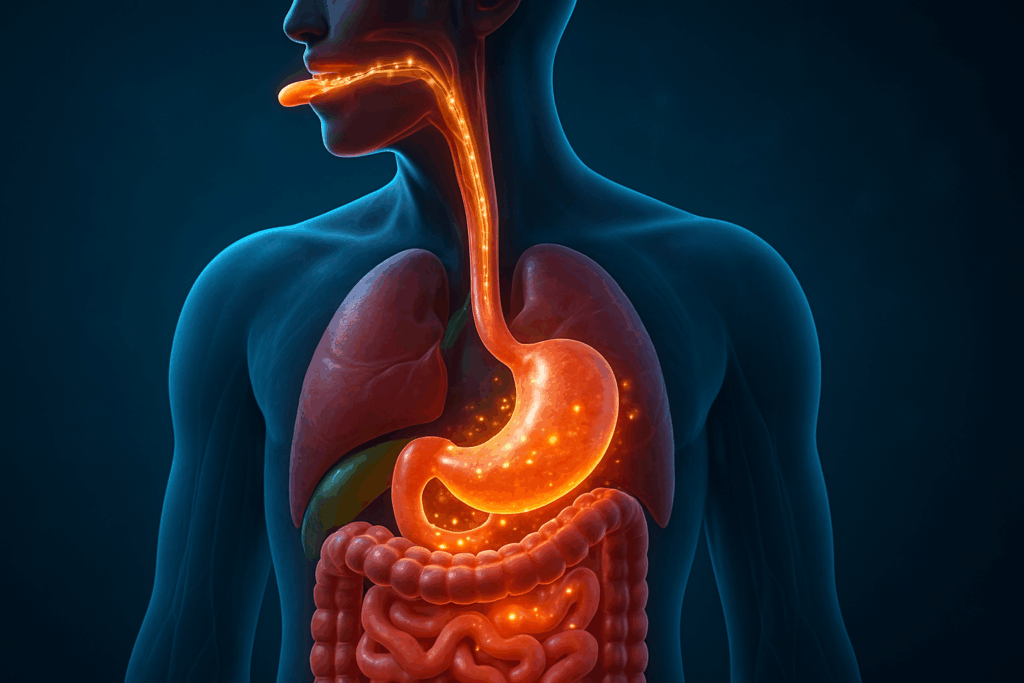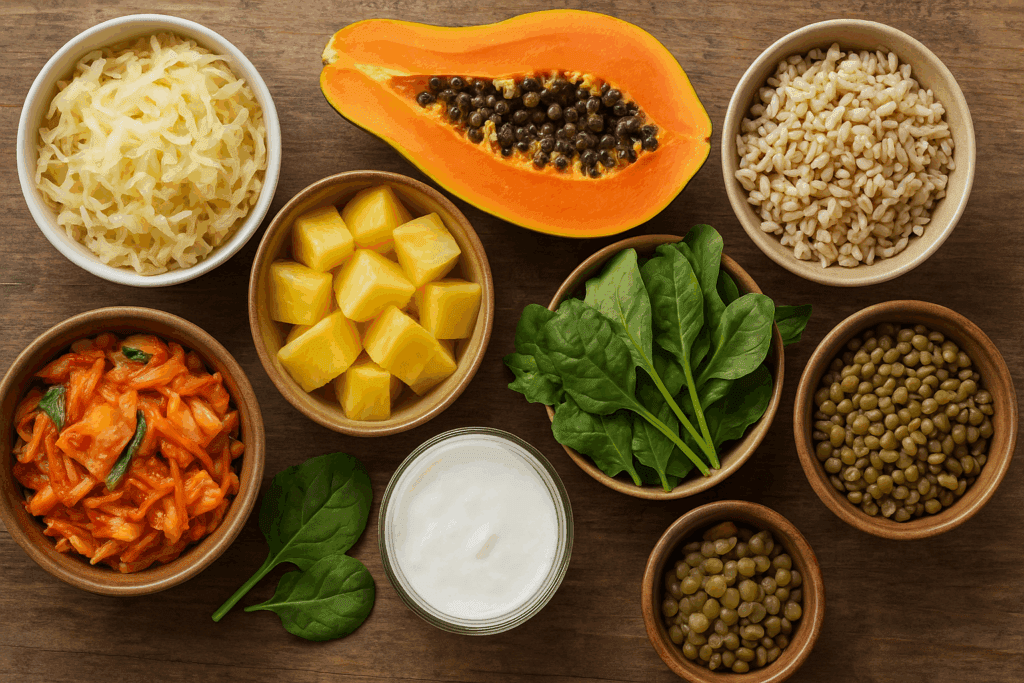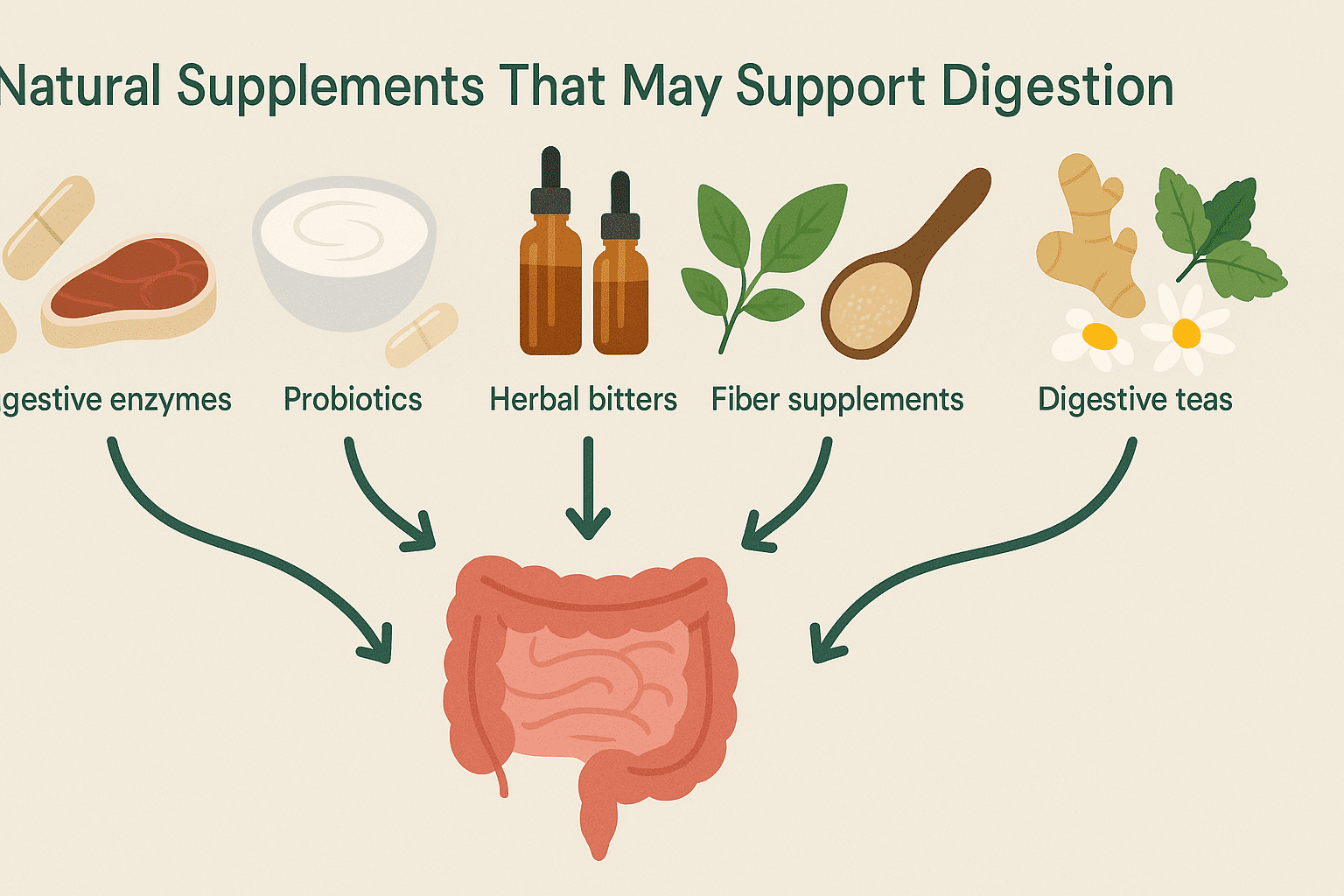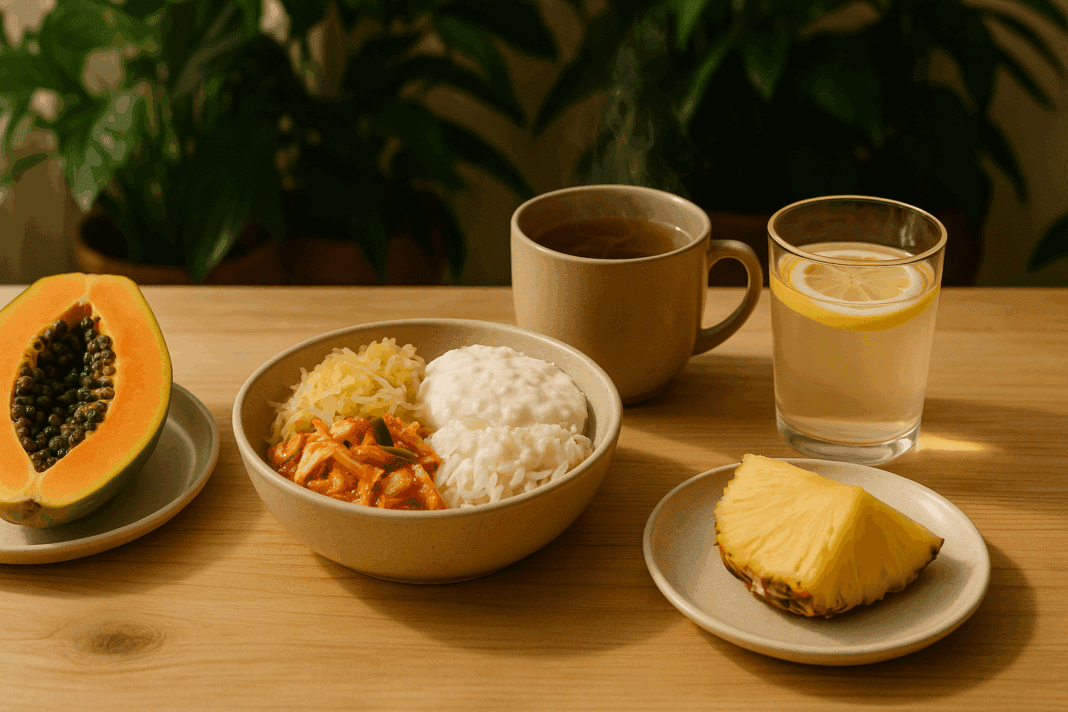In today’s fast-paced world, we often eat quickly, snack without thinking, and forget how our daily choices affect our gut. Digestion is a vital process that influences far more than just how we process meals—it impacts our mood, immune system, metabolism, and overall health. Many people ask, how can I digest food faster? or what helps digestion after eating? because they feel sluggish, bloated, or uncomfortable after meals. The good news is that improving digestion doesn’t require extreme diets or complicated regimens. By making smart, mindful changes in eating habits and lifestyle, you can support your gut naturally and learn how to digest quickly without compromising your well-being.
Modern research now confirms what many traditional healing systems have known for centuries: optimal digestion is foundational to long-term health. Whether you’re trying to feel lighter after meals or wondering how to make food digest faster, the strategies are often simple but profoundly effective. This article explores expert-backed, evidence-based strategies that support natural digestion and gut health while answering your most pressing questions—like how can I digest faster?—through a practical, engaging lens.
You may also like: How Mindful Eating Habits Can Help You Make Healthier Food Choices: Expert Tips for Conscious Nutrition and a Balanced Lifestyle

Understanding the Digestive Process: A Complex System in Motion
Before diving into ways to improve digestion, it’s essential to understand what happens inside your body when you eat. Digestion begins in the mouth, where enzymes in saliva start breaking down carbohydrates. As food travels through the esophagus to the stomach, powerful acids and enzymes further dismantle proteins and fats. From there, nutrients are absorbed in the small intestine, and waste continues to the large intestine for excretion.
When you ask how to digest faster, it’s important to understand that your body is already designed for efficiency—but that efficiency depends on many factors. Stress, poor dietary habits, dehydration, and lack of movement can all slow things down. On the other hand, practices that support enzyme production, microbial balance, and motility can naturally speed up the process. This balance is key for anyone wondering how to make food digest faster in a healthy, sustainable way.
Moreover, digestion is closely linked to the gut-brain axis—a communication network between your digestive system and central nervous system. This means emotional stress can directly influence digestion. So, if you’re frequently asking how can I digest food faster, the answer often lies in both lifestyle adjustments and mindful practices that address the whole body.

Mindful Eating: The Foundation of Digestive Wellness
One of the simplest, most overlooked ways to improve digestion is through mindful eating. Taking the time to chew thoroughly and eat slowly allows digestive enzymes in the saliva to break down food more effectively. It also gives your brain a chance to signal fullness before overeating occurs.
People often ask how to digest faster after meals, but the solution often starts before the first bite. Chewing each mouthful 20 to 30 times may seem excessive, but it dramatically reduces the workload on your stomach. This is a natural way to help your body digest quickly without needing supplements or interventions.
Eating without distractions, such as television or smartphones, also helps your nervous system shift into “rest and digest” mode. When the body is relaxed, digestion is more efficient. If you find yourself regularly wondering how can I digest faster, returning to mindful, undistracted eating may be the most profound shift you can make.
Furthermore, paying attention to your body’s hunger and satiety cues fosters a stronger connection with your natural digestive rhythms. Instead of eating by the clock or out of boredom, this approach supports long-term gut health and enhances your ability to digest food efficiently.

Hydration: A Critical Player in Digestive Speed and Efficiency
Water plays a central role in virtually every bodily function, and digestion is no exception. Adequate hydration helps dissolve nutrients, supports smooth bowel movements, and keeps digestive juices flowing properly. Many people seeking answers to how to digest faster overlook this simple but essential practice.
Drinking enough water throughout the day ensures that the lining of your digestive tract remains moist and capable of producing the necessary mucus and enzymes. While it’s a myth that drinking water during meals “dilutes stomach acid,” excessive amounts might slow digestion in some individuals. The key is moderation and listening to your body’s cues.
If you’re looking for natural strategies for how to make food digest faster, try starting your day with a glass of warm water with lemon. This age-old remedy is believed to gently stimulate bile production and prepare your stomach for the day’s meals. While not a miracle cure, it’s a helpful and safe addition to a digestion-friendly routine.
Additionally, herbal teas such as peppermint, ginger, and chamomile have been shown to aid digestion by soothing the digestive tract and improving motility. Sipping these after meals can be a gentle, effective way to support those wondering what helps digestion after eating.

Foods That Naturally Support Faster Digestion
If you’re frequently searching for how can I digest food faster, one of the most direct routes is through your diet. Certain foods naturally promote faster digestion by increasing enzyme production, supporting gut motility, or fostering beneficial bacteria in the microbiome.
Pineapple and papaya, for instance, contain natural digestive enzymes—bromelain and papain, respectively—that help break down proteins. Including these fruits in your diet can assist with protein digestion, especially after heavier meals. Fermented foods like sauerkraut, kimchi, miso, and kefir introduce probiotics that support gut flora and help maintain a healthy digestive environment.
Leafy greens and high-fiber vegetables add bulk to your stool and promote regularity, which is essential for anyone interested in how to digest quickly. However, it’s important to increase fiber gradually and pair it with adequate water to avoid bloating or discomfort.
Legumes, whole grains, and seeds are also beneficial when consumed in their least processed forms. While high in fiber, these foods nourish your microbiota and create the conditions for more efficient digestion over time. If you’re aiming for how to make food digest faster, consider adding a variety of these plant-based foods to each meal.

Lifestyle Habits That Influence Digestive Speed
Your lifestyle plays a substantial role in how efficiently your body processes food. Regular movement is one of the most effective and natural ways to support digestion. Even light walking after meals can help stimulate intestinal contractions and reduce feelings of bloating. This is particularly helpful for those who want to know what helps digestion after eating in a practical, everyday sense.
Stress management is equally critical. Chronic stress activates the sympathetic nervous system—our fight-or-flight mode—which suppresses digestive function. Practices such as yoga, meditation, deep breathing, and even spending time in nature can help shift the body into parasympathetic mode, supporting digestion and overall health.
Sleep also has a strong connection to gut function. Poor sleep disrupts the body’s circadian rhythms, which in turn impacts gastrointestinal motility and microbial balance. If you’re wondering how to digest faster but routinely get less than seven hours of sleep, addressing your sleep hygiene may be just as important as your diet.
Finally, avoiding late-night meals and heavy dinners can prevent indigestion and sluggish digestion. The body’s digestive processes naturally slow down in the evening, so eating too close to bedtime may lead to discomfort. If you’ve been asking how to digest quickly, simply shifting your last meal earlier in the evening may offer significant relief.

Natural Supplements That May Support Digestion
For those who still experience slow digestion despite healthy habits, certain natural supplements may provide support. Digestive enzyme blends can help break down proteins, fats, and carbohydrates more efficiently, especially for individuals with low enzyme production due to age or medical conditions.
Probiotics are another widely studied supplement that can help balance gut flora and improve digestion. Strains such as Lactobacillus and Bifidobacterium have been shown to support bowel regularity and reduce symptoms of gas and bloating. These are useful tools for anyone seriously exploring how can I digest food faster with evidence-backed solutions.
Another option includes herbal bitters, which stimulate bile and digestive secretions when taken before meals. They’ve been used traditionally in many cultures and can be especially helpful for those who feel heavy or sluggish after eating. However, they should be used under professional guidance if you have acid reflux or other gastrointestinal conditions.
It’s important to remember that supplements should complement—not replace—fundamental health habits like mindful eating, balanced nutrition, and regular movement. If you’re using supplements to figure out how to make food digest faster, they work best as part of a broader strategy rather than a quick fix.
When Sluggish Digestion May Signal an Underlying Issue
While many cases of slow digestion can be improved with natural strategies, persistent symptoms may warrant medical attention. Conditions such as gastroparesis, irritable bowel syndrome (IBS), and small intestinal bacterial overgrowth (SIBO) can significantly impact how your body digests food.
If you regularly experience bloating, constipation, abdominal pain, or nausea that doesn’t resolve with lifestyle changes, it’s essential to consult a healthcare provider. Asking how to digest faster may be a symptom of a more complex issue requiring diagnosis and personalized care.
Additionally, some medications—such as opioids, antacids, or certain antidepressants—can slow digestion. If you suspect your medication is playing a role, speak to your doctor about possible alternatives or supportive therapies.
Understanding when to seek professional help ensures that you’re not just masking symptoms, but addressing the root causes. Supporting gut health naturally is powerful, but it’s most effective when done with awareness and guidance, particularly if you’re seeking sustainable solutions for how I can digest faster over the long term.
Frequently Asked Questions (FAQ): Smart Ways to Improve Digestion and Digest Faster
1. Can posture really influence how to digest faster after meals?
Absolutely—your posture plays a surprisingly significant role in digestive efficiency. Sitting upright after eating allows your stomach to maintain the natural positioning that supports gastric emptying and prevents acid reflux. If you’re wondering how can I digest food faster without relying on supplements, try maintaining good posture for at least 30 minutes after a meal. Slouching or lying down too soon can compress your abdomen, slow down digestion, and increase bloating. In some cases, light stretching or standing upright after meals can further aid in how to digest quickly by promoting smoother movement through the gastrointestinal tract.
2. Are there specific breathing techniques that support faster digestion?
Yes, diaphragmatic breathing—or deep belly breathing—can help regulate the nervous system and promote parasympathetic activity, also known as the “rest and digest” state. This is essential when you’re asking how to digest faster because digestion is most effective when your body is relaxed. Practicing deep breathing before or after meals can reduce stress hormones that impair digestion and stimulate better blood flow to digestive organs. To try this, inhale deeply into your abdomen for a count of four, hold for four, and exhale for six. If you’re struggling with sluggish digestion and asking how can I digest food faster, adding this mindful practice may offer unexpected support.
3. How does intermittent fasting affect the speed of digestion?
Intermittent fasting gives your digestive system extended periods of rest, which can actually improve its overall function and speed during eating windows. While it may not directly answer how to make food digest faster during a single meal, it supports long-term digestive resilience by promoting cellular repair processes like autophagy. People who follow time-restricted eating often report improved bowel regularity and reduced bloating. However, the timing of meals becomes more important; breaking your fast with lighter, easily digestible foods may better answer the question how to digest quickly after a prolonged fasting period. That said, intermittent fasting isn’t ideal for everyone—especially those with metabolic conditions—so consult a healthcare provider first.
4. Does cold food slow digestion compared to warm food?
The temperature of your food can have subtle effects on how efficiently it’s digested. Cold foods may slow down digestive enzyme activity and temporarily constrict blood vessels in the stomach lining, making it harder for your body to break food down quickly. If you’ve ever asked how can I digest faster and tend to eat a lot of cold meals like smoothies or salads, consider adding some warming elements like ginger or warm broth. While not a major factor for most people, those with sensitive digestion may find that warm meals support how to digest faster and more comfortably. Incorporating temperature-conscious eating can be a mindful way to support your digestive rhythm.
5. What role do circadian rhythms play in how to digest faster?
Your body’s internal clock significantly influences digestion, with gastrointestinal function being more active during daylight hours. Eating large meals late at night can slow digestion because the body naturally winds down in the evening. This is critical to understand when exploring how to make food digest faster, especially if late-night eating is a habit. Aligning your meals with daylight and stopping food intake a few hours before bed can support more efficient metabolism and gut motility. If you’re routinely wondering how I can digest food faster, consider shifting your eating window earlier in the day for improved results.
6. How do emotions influence digestive speed and comfort?
Your emotional state directly affects your digestive system through the gut-brain axis. Chronic anxiety, depression, or even short-term stress can slow motility, reduce enzyme secretion, and alter the gut microbiome—all of which work against efforts to learn how to digest quickly. If you’re asking how to digest faster, emotional regulation is just as important as food choices. Techniques such as cognitive-behavioral therapy (CBT), mindfulness meditation, and even gratitude journaling have been shown to improve gut symptoms by reducing stress responses. In many cases, supporting your mental health is an indirect but powerful answer to how can I digest food faster and sustainably.
7. Are there specific morning routines that enhance digestion for the rest of the day?
Yes, establishing a morning routine that includes hydration, gentle movement, and a balanced breakfast can set the tone for better digestion throughout the day. Drinking warm water shortly after waking can stimulate the gastrointestinal tract and support peristalsis—the wave-like motion that moves food through the intestines. If your goal is to make food digest faster, starting your day with a fiber-rich, enzyme-supportive breakfast like oatmeal with fruit or avocado toast can make a difference. Light stretching or yoga also activates abdominal muscles that help with motility. These routines collectively support how can I digest faster naturally without resorting to medications or harsh interventions.
8. How does travel impact digestion speed, and what can be done to manage it?
Travel often disrupts normal eating times, hydration levels, and sleep schedules—all of which impact digestion. Whether you’re crossing time zones or just altering your routine, many travelers find themselves constipated, bloated, or generally uncomfortable. If you’re asking what helps digestion after eating while traveling, prioritize hydration, stick to your normal meal timing as closely as possible, and walk frequently—especially on flights. Bringing along digestive herbal teas or probiotics can offer additional support. Remember, when your system is thrown off, it may take a few days to recalibrate, but consistent routines will help you get back to how to digest faster more easily.
9. Can chewing gum after meals really help you digest faster?
Chewing gum stimulates saliva production, which not only begins the digestive process but can also signal your stomach to release more acid in preparation for digestion. While it doesn’t offer a dramatic improvement, chewing gum post-meal may mildly support how to digest quickly by encouraging gastric activity. This small, simple habit may be particularly helpful for people who struggle with low stomach acid. That said, gum with artificial sweeteners may cause bloating in sensitive individuals, so opt for natural versions. If you’re experimenting with strategies for how to make food digest faster, chewing gum could be a low-risk technique worth trying in moderation.
10. Are there long-term risks of trying to force faster digestion unnaturally?
Yes, there are potential risks associated with aggressive efforts to speed up digestion using over-the-counter laxatives, high-dose enzymes, or extreme dietary patterns. While it’s natural to ask how can I digest faster, it’s important not to confuse efficient digestion with artificially accelerated elimination. Over-reliance on quick fixes can disrupt the gut microbiome, weaken digestive capacity, and lead to dependency on supplements or medications. A more sustainable approach involves supporting your body’s natural rhythms through consistent, nourishing practices. Ultimately, learning how to digest food faster in a healthy way means working with your body—not against it—to create lasting digestive wellness.
Conclusion: Small Changes, Big Benefits—Your Roadmap to Better Digestion
The journey to better digestion is rarely about drastic changes—it’s the consistent, mindful choices that make the biggest difference. From chewing slowly and hydrating adequately to including gut-friendly foods and managing stress, each step contributes to a more efficient digestive system. For those searching how to digest faster or wondering how can I digest food faster, the answers often lie in returning to simple, body-centered wisdom.
When you understand how digestion works and support it with proven habits, you allow your body to function at its best. You no longer need to rely on guesswork or chase miracle cures. Instead, you become more attuned to your body’s needs and more empowered in your everyday choices.
Whether you’ve been looking for how to make food digest faster or curious about what helps digestion after eating, the strategies we’ve explored show that nature and science can work hand in hand. A thriving digestive system doesn’t just process food—it supports energy, focus, immunity, and emotional well-being.
In the end, learning how to digest quickly isn’t just about speed. It’s about balance, support, and sustainable care. By nourishing your gut, you’re laying the foundation for a healthier, more vibrant life—one mindful bite at a time.
Was this article helpful? Don’t let it stop with you. Share it right now with someone who needs to see it—whether it’s a friend, a colleague, or your whole network. And if staying ahead on this topic matters to you, subscribe to this publication for the most up-to-date information. You’ll get the latest insights delivered straight to you—no searching, no missing out.
gut health tips, natural digestive remedies, improve gut function, healthy digestion habits, foods for gut health, digestive wellness, support healthy microbiome, digestion and hydration, mindful eating practices, digestive enzyme support, fermented foods benefits, gut-brain connection, stress and digestion, digestive supplements guide, eating habits for better digestion, natural gut support, improve digestion naturally, probiotic-rich foods, gut-friendly lifestyle, post-meal digestion tips
Further Reading:
Good foods to help your digestion
The 11 Best Ways to Improve Your Digestion Naturally
Super Steps to Boost Digestive Health
Disclaimer
The information contained in this article is provided for general informational purposes only and is not intended to serve as medical, legal, or professional advice. While NewsHealthWatch strives to present accurate, up-to-date, and reliable content, no warranty or guarantee, expressed or implied, is made regarding the completeness, accuracy, or adequacy of the information provided. Readers are strongly advised to seek the guidance of a qualified healthcare provider or other relevant professionals before acting on any information contained in this article. NewsHealthWatch, its authors, editors, and contributors expressly disclaim any liability for any damages, losses, or consequences arising directly or indirectly from the use, interpretation, or reliance on any information presented herein. The views and opinions expressed in this article are those of the author(s) and do not necessarily reflect the official policies or positions of NewsHealthWatch.

